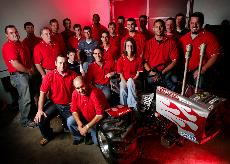The Louisiana Board of Regents reinstated Nicholls’ manufacturing engineering technology degree program after it had been terminated in 2006. The decision to cut the program was reversed in April because of the interest and concern shown by the industries that hire the program’s graduates, George Watt, director of manufacturing engineering technology, said. The demand for graduates of the program is so great in those industries, the program cannot keep up, Watt said.
Watt said the students in the program, which focuses more on the application of rather than theory of engineering, were very active in the process of having it reinstated.
“I would dare say if it had not been for the students and all the effort they put into getting industrial people more involved and more concerned, we would have not been successful,” Watt said.
The students circulated petitions at area industries, went to the Lafourche Parish Council to start a petition, contacted state representatives and wrote letters to the media explaining the situation, Watt said.
An independent consultant reviewed the program and reported that with some minor changes, the program could become accredited, Watt said. He said the deadline for accreditation is 2010, but the program is already in the process of preparing and expect a decision in 2009.
The Board of Regents cut the program last year primarily because it had not met the required eight graduates per year and suffered faculty shortages, Watt said. With Watt being the only full-time faculty member, he and Applied Sciences Department Head Terry Dantin taught the classes.
This fall adjuncts will take some of the load off Watt and Dantin. Help will also come from the program’s industry partners who have pledged to give money and allow their engineers to teach classes.
With so much time spent in the classroom, Watt said there was no time to focus on recruiting new students. He said that will be changing as he and a colleague go into high schools this fall and offer to teach topics from an engineering perspective in technical, science and math classes in exchange for 15-20 minutes at the end of class to speak to students about the program.
In hopes of catching the attention of future students, Watt said they would also try using the media more to get publicity, especially in regards to the program’s quarter-scale tractor project where students build a small tractor to use in pulling competitions.
During the program’s seven years, it has graduated 30 students, Watt said, and the graduates have gone into a wide variety of fields including construction, offshore petroleum production, tool manufacturing for the offshore industry and shipbuilding. Graduates hold positions such as technical sales, program and project management and design positions with starting salaries of approximately $50-55,000, Watt said.








